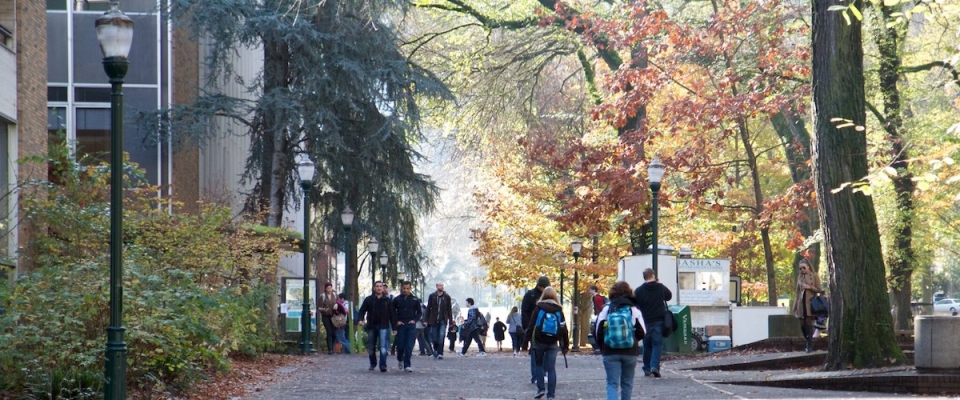Fall 2022 Courses in Transportation at Portland State

The fall term at Portland State University starts September 26, and registration opens September 6 for non-degree students. (Students who are already enrolled in a PSU degree program can register online now.) Lifelong learning is a guiding principle of PSU, and anyone interested can take transportation courses through the non-degree application process or as a post-baccalaureate student. Taking a course can be a good way to see if one of our graduate degree programs is right for you. Check out the course offerings below to see what's available this fall.
See PSU’s COVID-19 Student Resources for the latest info on our campus vaccination requirement for students and staff. If you're not sure when or where (or whether) to show up for your course, you can find clarification on all of PSU's course delivery methods here.
Civil and Environmental Engineering
Non-degree or non-PSU students should contact the Civil Engineering Academic Program Manager at ceedept@pdx.edu in order to register for a CEE course, as the system requires an approval to process the registration.
410 Applied Probability and Statistics
This course will introduce students to probability distributions, hypothesis testing and regression modeling with an emphasis on formulating and solving real-world problems using software that can be readily available to students now and later in the professional world. The course will focus on civil and environmental engineering applications and problems.
514 Friday Transportation Seminar
This weekly transportation seminar features a different speaker each week covering various topics in transportation research and practice. The topics cover all modes of transportation, with a focus on current practice. This is the same course as USP 514. This course may be taken for credit up to three times.
Urban Studies and Planning
556 Urban Transportation: Problems and Policies
An introduction to urban transportation policy from a historical and political perspective. Historical developments in transportation policy are traced from the early streetcar days up through the present. Federal, state, and local transportation policies are examined for their impact on urban spatial and economic development. An overview of current issues in transportation policy and planning includes transportation demand management strategies, transit- oriented design, road pricing, and alternative transportation modes. The intersection of environmental and transportation policy is also examined, as is the decision-making structure at the local, regional, and state level.
654 Data Analysis II: Lab and Lecture
Takes an applied approach to statistical analysis and research methodology and is the second in a two-course sequence. Provides students with statistical background, conceptual understanding, technical writing skills, computer application, and the ability to apply these skills to realistic data analysis problems and research designs. Topics include simple regression and correlation, multiple regression, and logistic regression. Recommended prerequisites: USP 634 or an equivalent course approved by the instructor and prior experience with statistical software.
657 Advanced Data Analysis: Discrete Choice Modeling
Presents the theory and practice underlying the formulation and estimation of models of individual discrete choice behavior with applications to travel, travel related and other choices. Provides students with an understanding of the theory, methods, application and interpretation of multinomial logit (MNL), nested logit and other members of the Generalized Extreme Value (GEV) family of models, as well as an introduction to mixed logit models. Prerequisite: USP 634 or equivalent intermediate statistics/econometrics course.
Friday Transportation Seminars
Friday Transportation Seminars at PSU are offered as a for-credit class in the Fall term (CE 514 / USP 514). However, these seminars are also open to the public! You can always find upcoming seminars on the TREC website.
Graduate Certificate in Transportation
The two disciplines, planning and engineering, also collaborate to offer a Graduate Certificate in Transportation for established professionals looking for a deeper understanding of transportation disciplines. Increasingly, transportation professionals need multi-disciplinary knowledge and skills to anticipate social, environmental, and technological trends and incorporate them into intelligently-integrated transportation systems. The Graduate Certificate in Transportation will offer you advanced education at the intersection of urban planning and civil engineering for those seeking to build upon their knowledge and credentials to move people and goods safely.
Photo courtesy of Portland State University
Portland State University's Transportation Research and Education Center (TREC) is home to the U.S. DOT funded National Institute for Transportation and Communities (NITC), the Initiative for Bicycle and Pedestrian Innovation (IBPI), PORTAL, BikePed Portal and other transportation grants and programs. We produce impactful research and tools for transportation decision makers, expand the diversity and capacity of the workforce, and engage students and professionals through education and participation in research.
